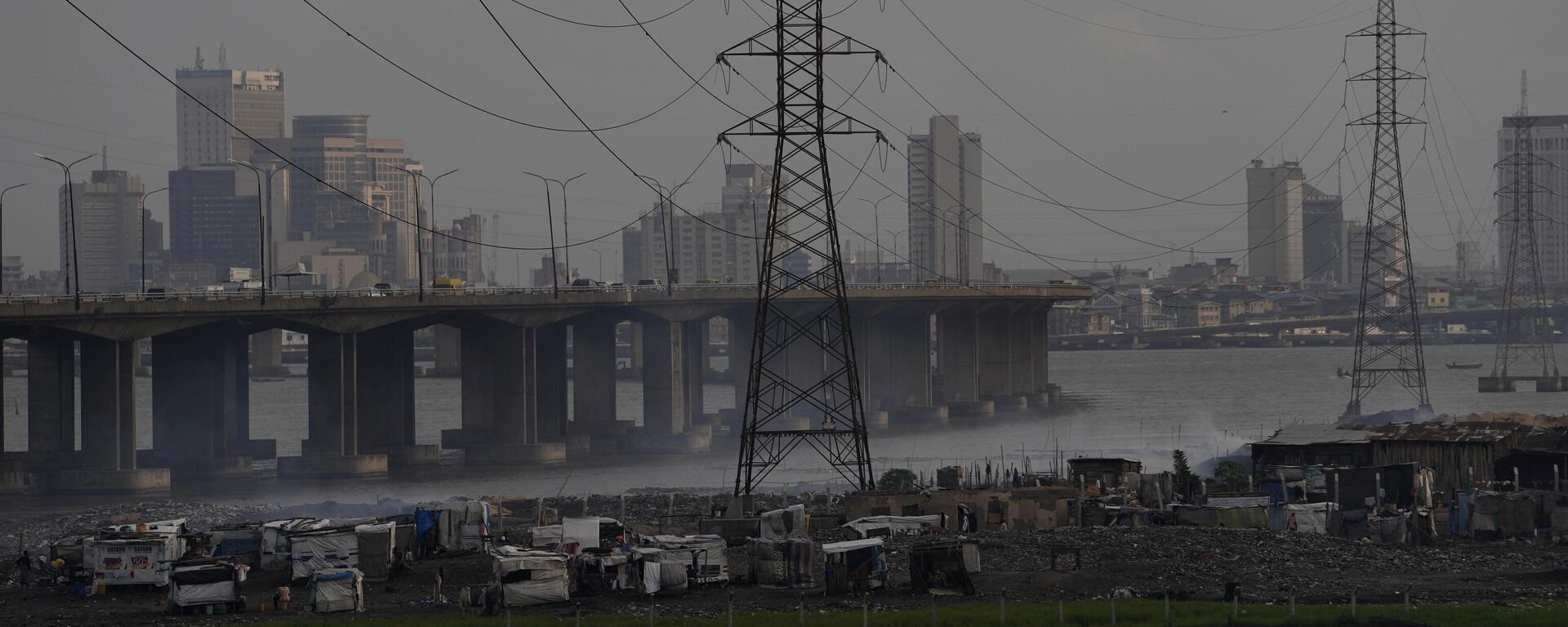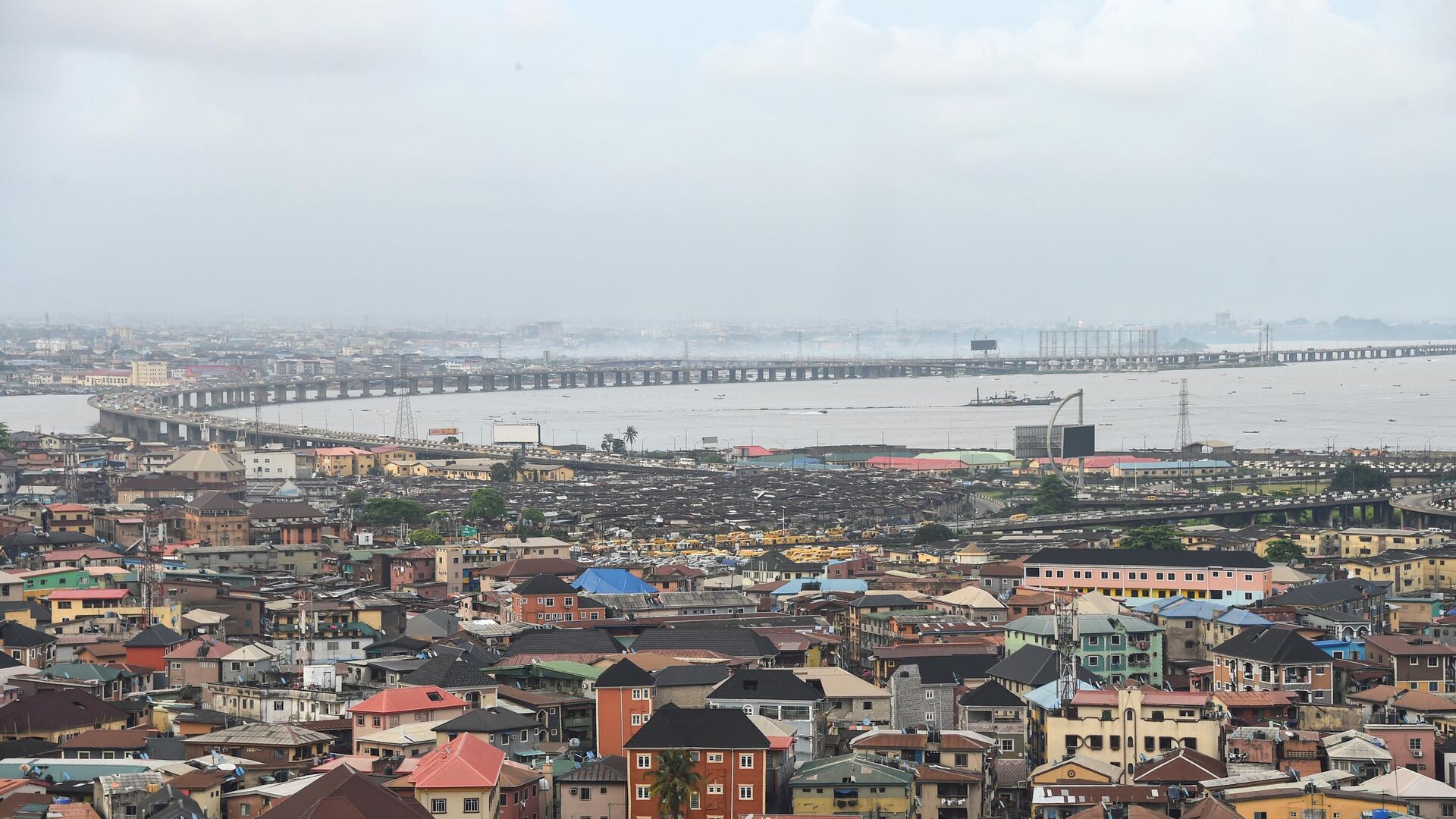https://sputnikglobe.com/20221128/nigerias-lagos-govt-shortlists-chinese-ventures-for-construction-of-25-billion-bridge--1104776454.html
Nigeria's Lagos Gov't Shortlists Chinese Ventures for Construction of $2.5 Billion Bridge
Nigeria's Lagos Gov't Shortlists Chinese Ventures for Construction of $2.5 Billion Bridge
Sputnik International
This article is about cooperation between Nigeria and China in infrastructure, in particular about the construction of the Fourth Mainland Bridge in Lagos, Nigeria.
2022-11-28T11:21+0000
2022-11-28T11:21+0000
2022-11-28T11:21+0000
africa
west africa
nigeria
bridge
lagos
construction
infrastructure
china
belt and road initiative
https://cdn1.img.sputnikglobe.com/img/07e6/0b/1c/1104777497_0:0:3077:1731_1920x0_80_0_0_c19c98fbe4d6d1e977fab8c130e6f139.jpg
Nigeria’s Lagos state government has shortlisted three bidders for the construction of the $2.5 billion Fourth Mainland Bridge project in the region, officials have said.The list of potential builders includes a consortium led by Portuguese construction firm Mota-Engil and two Chinese venture capital companies, namely China Communication and Construction Corporation and the China Road and Bridge Corporation. The two other shortlisted bidders are a joint venture between the China Gezhouba Group Company and China Geo-Engineering Corporation and a consortium led by the China Civil Engineering Construction Corporation. The preferred bidder for the construction of the bridge will be announced before the end of the year, according to officials.The Fourth Mainland Bridge is a project by the state government to build a 38km crossing connecting Lagos Island via the towns of Lekki, Langbasa, and Baiyeku, across the Lagos Lagoon to Itamaga in Ikorodu, southwestern Nigeria. The bridge will be built under a public-private partnership. As stated by the office of Public Private Partnership (PPP) of Lagos State, the bridge is expected to become the second-longest in Africa, with three toll plazas, nine interchanges, 4.5km Lagoon Bridge, a design speed of 120 kmph and an eco-friendly environment.The Third Mainland Bridge is the longest of three bridges that connect Lagos Island, the commercial hub of Lagos state, to Nigeria's mainland. As many residents commute to and from the Lagos mainland to the island every day, large traffic jams are common and a major problem. It has very high traffic, especially on weekends. According to officials, the construction of the Fourth Mainland Bridge is aimed at reducing severe congestion on the existing ones.China is one of Nigeria’s main trading partners. Apart from trade and investment, China finances large infrastructure projects and Chinese companies are often contracted to carry out construction processes, including railways, roads, and reconstruction of the country's main airports in Lagos, Abuja, Kano, and Port Harcourt. For example, in June, Nigeria handed over the construction site of Nnamdi Azikiwe International Airport's second runway to the China Civil Engineering Construction Corporation. Nigeria's minister of aviation stated that repairs on the runway were necessary and critical to the national economy and that it "would serve the country for a long time after the repair," as cited by Nigerian media. One of the China's latest industrial investments in Nigeria, the railway between Lagos and Ibadan, became operational in June, 2021. The project, which cost about $1.5 billion, is the first double-track standard-gauge railway to be built in West Africa.In 2018, Nigeria became a signatory to China's international infrastructure development project known as the Belt and Road Initiative (BRI). Proposed by China in 2013, the BRI is a global infrastructure development strategy that involves infrastructure, trade, and investment enhancement aimed at improving connectivity on a transcontinental scale. As of now, up to 43 African countries have joined the BRI by signing memorandums of understanding with China.Experts say the initiative has already contributed significantly towards transforming Africa's economies through infrastructure development, unemployment reduction, and improved trade. They highlight that the BRI is gradually deepening African nations' integration into the global economy and improving people's lives.
https://sputnikglobe.com/20221112/nigeria-invites-private-investors-for-concession-of-hydroelectric-power-plant-to-pay-off-loan-1104060858.html
africa
west africa
nigeria
lagos
china
Sputnik International
feedback@sputniknews.com
+74956456601
MIA „Rosiya Segodnya“
2022
News
en_EN
Sputnik International
feedback@sputniknews.com
+74956456601
MIA „Rosiya Segodnya“
Sputnik International
feedback@sputniknews.com
+74956456601
MIA „Rosiya Segodnya“
west africa, nigeria, china, infrastructure, belt and road initiative
west africa, nigeria, china, infrastructure, belt and road initiative
Nigeria's Lagos Gov't Shortlists Chinese Ventures for Construction of $2.5 Billion Bridge
China is a major investor and alternative to other sources of development funds for many African countries. Beijing’s investment in the Nigerian transportation system has offered the country access to capital and expertise for infrastructure development. The bridge construction in Lagos is also expected to be implemented with Chinese assistance.
Nigeria’s Lagos state government has shortlisted three bidders for the construction of the $2.5 billion Fourth Mainland Bridge project in the region, officials have said.
The list of potential builders includes a consortium led by Portuguese construction firm Mota-Engil and two Chinese venture capital companies, namely China Communication and Construction Corporation and the China Road and Bridge Corporation.
The two other shortlisted bidders are a joint venture between the China Gezhouba Group Company and China Geo-Engineering Corporation and a consortium led by the China Civil Engineering Construction Corporation.
The preferred bidder for the construction of the bridge will be announced before the end of the year, according to officials.
The Fourth Mainland Bridge is a project by the state government to build a 38km crossing connecting Lagos Island via the towns of Lekki, Langbasa, and Baiyeku, across the Lagos Lagoon to Itamaga in Ikorodu, southwestern Nigeria.
The bridge will be built under a public-private partnership. As
stated by the office of Public Private Partnership (PPP) of Lagos State, the bridge is expected to become the second-longest in Africa, with three toll plazas, nine interchanges, 4.5km Lagoon Bridge, a design speed of 120 kmph and an eco-friendly environment.
The Third Mainland Bridge is the longest of three bridges that connect Lagos Island, the commercial hub of Lagos state, to Nigeria's mainland. As many residents commute to and from the Lagos mainland to the island every day, large traffic jams are common and a major problem. It has very high traffic, especially on weekends. According to officials, the construction of the Fourth Mainland Bridge is aimed at reducing severe congestion on the existing ones.

12 November 2022, 16:58 GMT
China is one of Nigeria’s main trading partners. Apart from trade and investment, China finances large infrastructure projects and Chinese companies are often contracted to carry out construction processes, including railways, roads, and reconstruction of the country's main airports in Lagos, Abuja, Kano, and Port Harcourt.
For example, in June, Nigeria handed over the construction site of Nnamdi Azikiwe International Airport's second runway to the China Civil Engineering Construction Corporation. Nigeria's minister of aviation stated that repairs on the runway were necessary and critical to the national economy and that it "would serve the country for a long time after the repair," as cited by Nigerian
media.
One of the China's latest industrial investments in Nigeria, the railway between Lagos and Ibadan, became operational in June, 2021. The project, which cost about $1.5 billion, is the first double-track standard-gauge railway to be built in West Africa.
In 2018, Nigeria became a signatory to China's international infrastructure development project known as the Belt and Road Initiative (BRI). Proposed by China in 2013, the BRI is a global infrastructure development strategy that involves infrastructure, trade, and investment enhancement aimed at improving connectivity on a transcontinental scale. As of now, up to 43 African countries
have joined the BRI by signing memorandums of understanding with China.
Experts say the initiative has already contributed significantly towards transforming Africa's economies through infrastructure development, unemployment reduction, and improved trade. They highlight that the BRI is gradually deepening African nations' integration into the global economy and improving people's lives.





